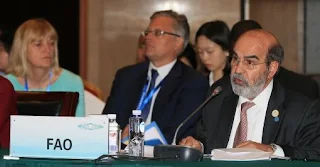There is a burgeoning small, fast growing wild fish sector with
capabilities to feed the continent of Africa, says the latest study of the Food
and Agriculture Organisation (FAO) especially from drylands, reports
NaijaAgroNet.
The new FAO report on fisheries in the drylands of
sub-Saharan Africa, its crucial to look towards these allies in the race to end
hunger in some of the world's most chronically poor and underfed regions.
Lead author of the study, Jeppe Kolding, a professor of
biology at the University of Bergen in Norway, noted that in order to get fish
in a dryland their eggs could be boosted.
"Fish are incredibly productive when conditions are
right. Their egg-laying capacities made them, more like insects than other
vertebrates," he said.
Although the study recognized water as an ephemeral resource
in Africa's dryland regions, which could be formed and disappearing relatively in
a short period of time could not be surprising.
Kolding noted that despite this, fish some of which weigh as
little as a few grams at maturity could survive and thrive in these
environments, meaning the continent's dryland fisheries are in fact highly
productive and resilient.
Pointing out that output from dryland fisheries fluctuates
due to climate trends - mainly low and above all uncertain rainfall -but
productive potential is very high in smaller water bodies, some of which appear
only once a decade but could produce up to 150 kilograms of fish per hectare
per year. Together, these small water bodies cover a much larger area than the
sub-Saharan region's lakes and reservoirs.
This, the study said, if properly managed, these bodies in
southern Africa alone could produce 1.25 million tonnes of fish, which is half
the total recorded inland fisheries yield of the entire continent.
... Linking agrobiz, sustainable environs, people & technology











